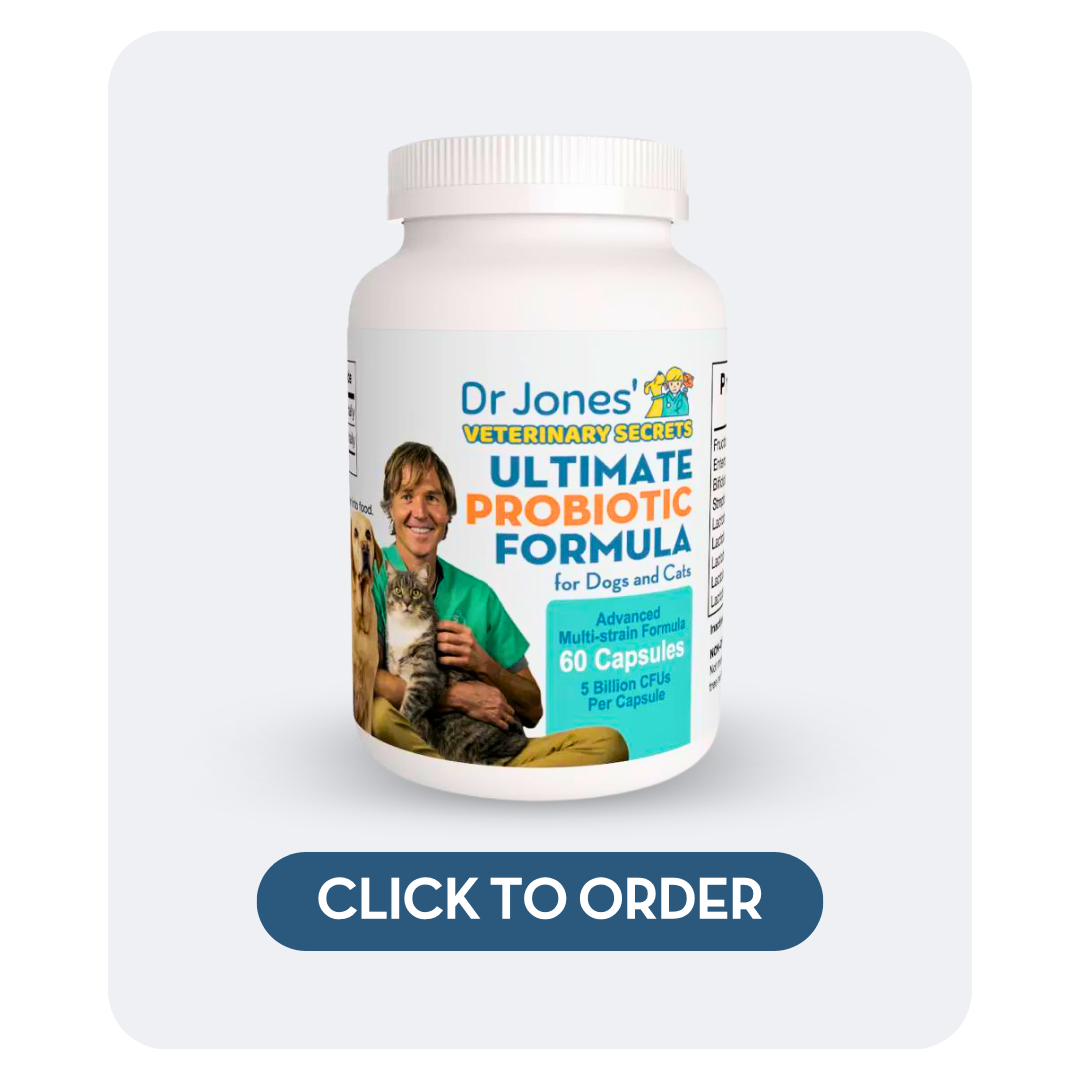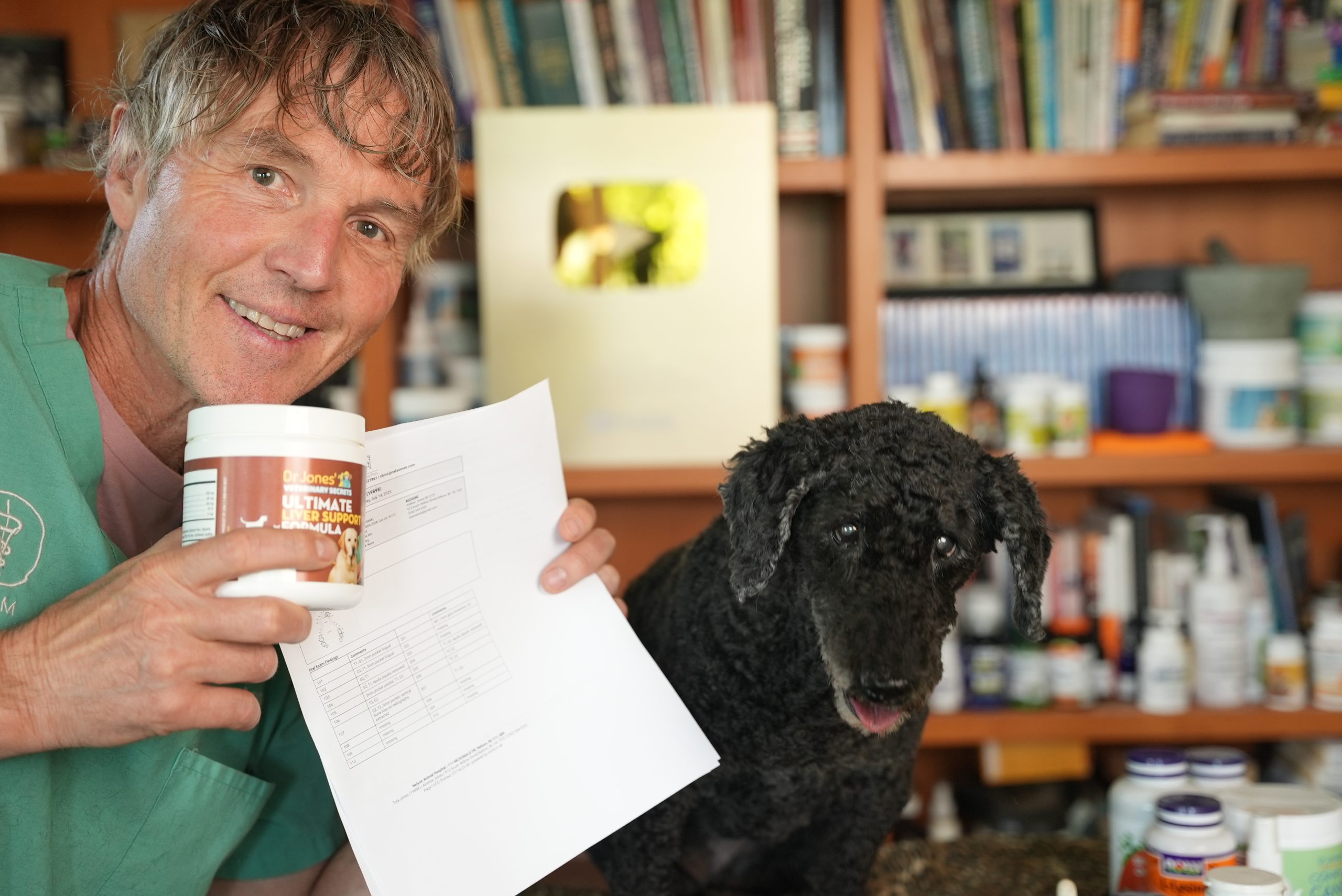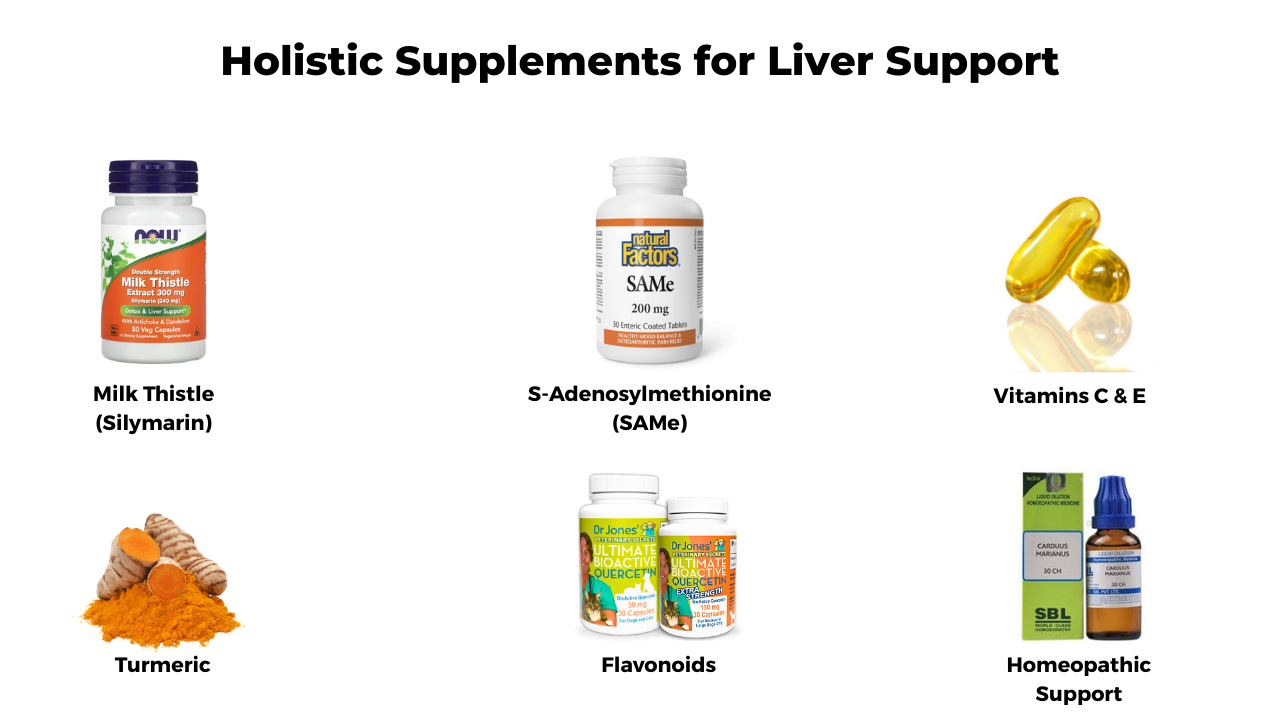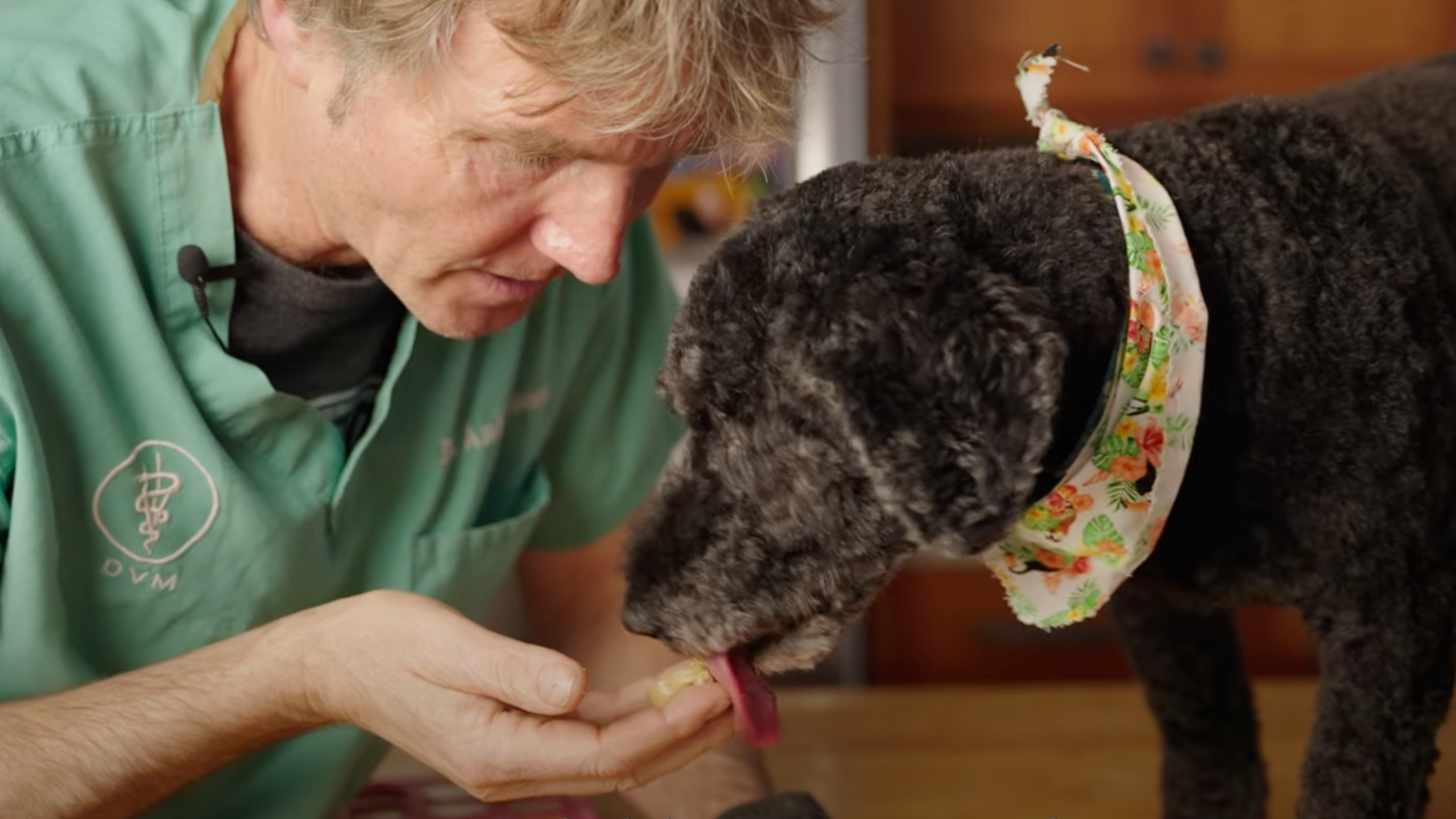How to Naturally Treat Liver Disease In Dogs – Vet-Approved Solutions
![]()

Give Your Dog’s Liver the Support It Needs
Your dog’s liver does an incredible amount of work every day—detoxifying, producing vital proteins, regulating hormones, and even helping with digestion. But when liver disease strikes, these essential functions can quickly be compromised, and spotting the signs early is crucial. From subtle changes in appetite to jaundice or digestive issues, knowing what to watch for can make all the difference in supporting your pet’s health.
In this article, I’ll walk you through the common causes of liver disease in dogs, the signs to watch for, and the natural ways you can support liver function—from nutrition to powerful herbal and antioxidant supplements. Whether your dog is young or senior, proactive liver care can help them feel better, stay energetic, and thrive.
Give Your Pet a Delicious Boost with Dr. Jones’ Ultimate Liver Support Formula
To make liver support simple and effective, I created Dr. Jones’ Ultimate Liver Support Soft Chews. Packed with premium ingredients like milk thistle, dandelion root, SAMe, Vitamin E, and curcumin, these chews help protect the liver, support detoxification, improve digestion, and fight oxidative stress.
And the best part? They’re tasty soft chews your dog will actually enjoy—no pills, no fuss. Vet-approved and carefully formulated, each chew works on multiple levels to ensure your pet’s liver stays healthy and strong. Regular use helps maintain optimal liver function, enhances overall wellness, and gives you peace of mind knowing you’re supporting your dog from the inside out.


How to Naturally Treat Liver Disease in Dogs
Your dog’s liver is one of the largest and most important organs in their body. It plays a key role in digestion, detoxification, storing sugar, breaking down red blood cells, and producing hormones. The liver sits under the rib cage, wrapping around the stomach and tucked close to the diaphragm. In this article, I’ll walk you through the common causes of liver disease in dogs, signs to watch for, how it’s diagnosed, and natural ways to support liver health.
Common Causes of Liver Disease in Dogs
Liver disease can result from a variety of causes, ranging from infections to toxins and genetic issues:
-
Toxins: Dogs often eat things they shouldn’t—like compost or spoiled food—which can cause acute liver damage.
-
Infections: Viral infections, such as hepatitis, can affect the liver.
-
Congenital Issues: Young dogs may be born with liver shunts, and certain breeds—like Bedlington Terriers, West Highland Terriers, Keeshond, and Dalmatians—can have copper storage deficiencies that affect the liver.
-
Medications: Common veterinary medications, including NSAIDs, can harm the liver.
The good news is the liver has a remarkable ability to regenerate. With proper care and support, liver cells can heal.
Recognizing the Signs of Liver Disease
Early liver disease can be tricky to spot because symptoms are often subtle or non-specific. Some signs to look out for include:
-
Appetite changes: Loss of interest in food.
-
Behavioral changes: Lethargy, depression, or just “ain’t doing right” (ADR).
-
Digestive issues: Vomiting or diarrhea.
-
Increased thirst and urination.
-
Fluid retention: Low protein levels (albumin) may cause a swollen belly.
-
Jaundice: Yellowing of the gums or whites of the eyes.
-
Uncommon symptoms: Neurologic signs (circling, head pressing, seizures) or hepatocutaneous syndrome, which affects the skin and paw pads.
Diagnosing Liver Disease
Diagnosing liver disease starts with a physical exam and a detailed history. Blood tests are essential, often revealing:
-
Elevated liver enzymes (ALP, ALT, GGT) and bilirubin
-
Low red blood cell count (anemia)
-
Low protein levels, particularly albumin
Urine tests may show bilirubin or brownish/yellowish urine. Once liver disease is suspected, your veterinarian will help determine the specific type of liver issue, since treatment can vary widely depending on the cause.
Supporting Liver Health Through Nutrition
Nutrition is a critical part of helping your dog’s liver recover:
-
Offer food your dog loves—sometimes warming it up or adding a small bit of garlic can encourage eating.
-
Many holistic approaches recommend a moderate protein, moderate carbohydrate diet. Special veterinary diets may be advised, but the key is making sure your dog actually eats.
Holistic Supplements for Liver Support
There are several natural options that can support liver health:
Milk Thistle (Silymarin)
-
Protects liver cells, reduces inflammation, and helps with toxin-induced damage and cirrhosis.
-
Dose: 100 mg per 10 lbs of body weight daily.
S-Adenosylmethionine (SAMe)
-
A potent antioxidant effective for chronic liver disease.
-
Dose: 800 mg per 40 lbs of body weight daily.
Vitamins C & E
-
Work alongside SAMe to reduce liver cell damage and aid regeneration.
-
Dose: Vitamin E—400 IU per 40 lbs daily; Vitamin C—250 mg per 40 lbs daily.
Turmeric
-
Anti-inflammatory, antioxidant, and supports liver, digestive, and skin health.
-
Dose: 100 mg per 10 lbs daily (or 2 drops per 10 lbs twice daily as a tincture).
Flavonoids
-
Found in colorful fruits and vegetables, these compounds help normalize the immune system.
-
Include bioflavonoids like apigenin, quercetin, and EGCG (from green tea).
-
Dose: 250 mg per 10 lbs daily.
Dr. Jones’ Ultimate Liver Support Formula
To make liver support simple and effective, I created Dr. Jones’ Ultimate Liver Support Soft Chews. Packed with premium ingredients like milk thistle, dandelion root, SAMe, Vitamin E, and curcumin, these chews help protect the liver, support detoxification, improve digestion, and fight oxidative stress.
Homeopathic Support
-
Carduus Marianus, derived from milk thistle, can be used for dogs that can’t tolerate capsules.
-
Dose: 1 capsule per 20 lbs twice daily (low potency, 30C).
Key Takeaways
Liver disease is one of the more common health concerns in dogs. Symptoms can include:
-
Loss of appetite
-
Weight loss
-
Vomiting or diarrhea
-
Swollen abdomen
-
Jaundice
Causes range from toxin ingestion to reactions from medications or immune system issues. Thankfully, the liver can heal, and there are many natural options to support recovery—from milk thistle to flavonoids and green tea extracts. With the right care and nutritional support, your dog’s liver can stay healthy and strong.
Give Your Pet a Delicious Boost with Dr. Jones’ Ultimate Liver Support Formula
To make liver support simple and effective, I created Dr. Jones’ Ultimate Liver Support Soft Chews. Packed with premium ingredients like milk thistle, dandelion root, SAMe, Vitamin E, and curcumin, these chews help protect the liver, support detoxification, improve digestion, and fight oxidative stress.
And the best part? They’re tasty soft chews your dog will actually enjoy—no pills, no fuss. Vet-approved and carefully formulated, each chew works on multiple levels to ensure your pet’s liver stays healthy and strong. Regular use helps maintain optimal liver function, enhances overall wellness, and gives you peace of mind knowing you’re supporting your dog from the inside out.















I have had success with a product called Marin and a home cooked diet.
thank you for the information and a greater understanding of the problem,I enjoy reading all Dr. Jones material and have learned a great deal.
Excellent article and advice. I agree with all of it and indeed have had several occasions to test these herbs on my dogs.
All herbs mentioned can be obtained from
http://www.naturallyanimals.co.uk. Absolutely the Best.
when our 9.5 year old great dane started fitting I thought she was having a heart attack, but luckily the symptoms of the fitting was caused by a liver complaint. We’ve learnt a lot and and totally concur with Andrew about abstaining from feeding complete dried dog foods. I now prepare Dreama’s food every couple of days which consists of wholemeal pasta, wholemeal rice, potato, porridge, lots of fresh veg, fish chicken and lots of white meat as opposed to red meat which is harder to digest.
Milk Thistle from the vet was really expensive so i sourced my local horse supplier who sells it loose leaf in 500G tubs. I add 2 scoops and incorporated stinging nettles very high in Vitamins, zinc, potassium and nitrogen. Also she has some dock weed, chickweed, dandy lion and rapeseed leaves and cabbage and lots of green veg. clover leaves are excellent.
It’s amazin how your garden is abundant in natural food stuffs provided you don’t administer weed killers.
We also went to out local gym and acquired big tubs of glutamin, creatin as they boast the immune system also things like amino acids that can be purchased in much larger quantities rather then the cost of the local health food shop.
The proof of the pudding has to be our old lady who now runs around the garden like a puppy.
Dreama is still of etherine for her seizures but fortunately she has not had a fit for 3 months. Being a great dane weighing in at 60KG she was started of on 4tabs 60mg a day, but over a period of time have cut her down to 3/4 in the morning and 1.5 tabs at night.
Etherin can effect the liver and mindful to keep the dogs diet free from processed food, Etherin does increase the appetite and Dreama now eats four meals a day but part of her meal at lunch time is buttered bread soaked in pro biotic yogurt, which again is good for the digestive tract and liver, As a household as well as the dog we’ve switched to bottle water and have noticed the difference and not got that horrible chloride taste and hopefully see natural spring water as cleansing.
We also add powdered ginger and garlic which is an anti- inflammatory.
We’ve been back to the vets for blood tests, who’s very impressed at the recovery of Dreama considering 3 months a go she was at deaths door.
Hope this helps
Brad
I would like to hear your comments on the fact that our pets are being symptomatically poisoned by flea collars, flea sprays, flea drops, flea & wormer shots and heart worm meds which all contain toxic pesticides that damage the liver.
Many of these products are used improperly and many at the same time.
Thanks for your informative newsletters.
I had written you on Chauncy’s liver count of 508 and asked what else I could do beside give him the Denamarin which he has been on. You suggested 500 mg Milk thistle added to his Denamarin. I am sending you smiles and hugs as in just TWO weeks his ALT went from 508 to 108, the lowest it has every been. The vet’s assistant could not believe it as he stated the Denamarin would not of done that on its own. I told him about you and how you are so amazing, the knowledge you have is a gift that I feel fortunate to have. I also have your ultimate canine health formula on auto ship for Chauncy which is giving me amazing results. I trust your suggestions and believe you are a man whom actually cares about on furry kids.
My question is do I still give him the Milk Thistle along with his Denamarin. I have sent you a private e-mail on this question but just wanted to let people know you are the greatest vet ever and wish I could find someone like you in Florida.
Im in fl too wish dr Jones was my vet ?Not a decent vet so far in Palm Beach area(sorry i moved here)2 yrs& abt 5,000$ later shes worse. You seem to be having good luck w/ your fur buddy ?.my Bellas been sick w/ gerd like symptoms & chronic cough since I took her to a vet for mild but persistent cough during covid .he gave her unneeded rabies 2yr shot w/o asking,said trachea issues & then moved out if state?????Shes 12 yrs old & been 100x worse ever since. Now elevated liver enzyme’s.ect So my question Did you find a good vet yet? & if so ? & what worked for your dog if you dont mind? Sincerely thanks kathie
In response to Josephine Testa wanting a holistic vet in Florida, we use Dr. Tiffany Rimar I St. PETE BEACH,FLORIDA.
In response to Josephine Testa wanting a holistic vet in Florida, we use Dr. Tiffany Rimar I St. PETE BEACH,FLORIDA. Her phone number is 727-360-5700 at 431 Corey Avenue. St. Pete Beach, Florida 33706.
Why would spicing my dogs good with garlic be good? Garlic is poisonous for dogs.
Aloha,
My 14 year old Chihuahua/Terrier has very elevated liver enzymes: ALT 1754 and ALP 790 on her last test. Three months before that her counts were: ALT 458 and ALP 393. She is currently on Denamarin and Metronidazole. Our Veterinarian is discontinuing the Metronidazole and suggested a Bile Acid study. If that does not provide a clear reason for the elevated enzymes she will do an ultrasound. Her primary diet for that last 14 years has been Solid Gold kibble.
Do you have any recommendations or thoughts on tests/treatments? Thank you so much for your time!
Warmest mahalo,
Lisa
This website has been very informative and beneficial. My 14 yr old, 20lb miniature eskimo was diagnosed with elevated liver enzymes. This article gave me a better understanding and information on treating is liver. Thank you so much for the information!
I just want to thank you so very much for sharing this information! Our Doberman was diagnosed with Copper Storage Disease by the vet & basically given a few weeks to starve to death diagnosis! She has gained 6 lbs in a week, keeping her (homemade) food down & has lots of energy again! We are hopeful after thinking we would be losing her, she’s only 3 & 1/2. Thank you again??
Also wondering about zinc for a dog with Copper Storage Disease? And dosage
There is a typo/missing portion on Dr. Jones’ article on natural treatment of liver disease.
My (almost) 13-year old Corgi has elevated results of ALT (436) and a whopping ALP of 4,000 (!!)
Error appears after Dr. Jones’ recommendation of turmeric and refers to a different ‘dried herb’, name is not mentioned.
(here):
Antioxidants can fight free radicals and may reduce or even help prevent some of the damage they cause..
The dose of the dried herb is 100 mg per 10 lbs of body weight daily. It can also be given as a tincture of 2 drops per 10lbs twice daily.
Can someone advise what herb or anti-oxidant is referred to here. Many thanks.
Janine Devine,
To answer your question. The antioxidant he is referring to is TUMERIC.
“Turmeric gives curry its flavor and yellow color, and has been used as an anti-inflammatory, to treat digestive and liver problems, skin diseases, and wounds while also being a powerful ANTIOXIDANT…..Antioxidants can fight free radicals…… The dose of the dried herb is 100 mg per 10 lbs of body weight daily. It can also be given as a tincture of 2 drops per 10lbs twice daily”
Hope that helped clarify the confusion.
My dog is about nine years old and she was diagnosed with a slow growing tumor on her liver my vet just gave her a human liver tablet when i ask another vet if the liver regenerates and her said no. i am devastated they didn’t say anything about her diet . the one said i should put her down sooner than later. i cannot do that she is eating in fact she wants to eat all the time the only thing is that she has this distended tummy. please i need help
I would certainly seek out another vet. Read all the stories/comments on this page. I think you will get some help. Milk Thistle is certainly one thing you want to do right away. Dr. Jones is also suggesting Tumeric. Tumeric upsets my stomach so not sure how my dog would do with it. You can also get Sam-e to give along with the milk thistle. K9immunityplus is for dogs with cancer (go to k9Medicinal website) to build up the immune system. Great product. There is a DogCancerSupport site where you can get information from all the people who post. There is also a site and FB page for something called the Tagamet/Benadryl Protocol you might want to research and read. Knowledge is power. Google and read! Good luck.